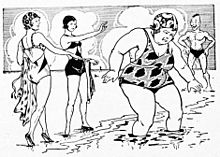身体羞辱
外观

身体羞辱(英语:Body Shaming)是指根据他人体貌特征而对他人进行羞辱或批评的行为。身体羞辱的范畴非常广泛,包括但不限于肥胖的社会污名、瘦弱、身高歧视、体毛多或少、发色、体型、肌肉发达程度或缺乏肌肉、生殖器大小(如阴茎或乳房大小)、外貌至上主义及肤色。甚至有时候身体羞辱可能包括对于纹身与穿洞,或像银屑病这类会留下身体印记的疾病进行羞辱。[1]
一项针对儿童电影与书籍中的外貌讯息的研究指出,很多针对儿童的媒体都有提到吸引力视是人际关系与互动中的重要元素。[2]在该研究中,两部迪士尼电影提到有关个人美貌的内容最多。此外研究还发现,64%的被调查影片中的肥胖角色是丑陋、邪恶、残忍或不友善的。[3]
某些形式的身体羞辱源于古老的民间迷信,例如对红发人群的歧视,以及对金发人群的刻板印象。[4]不同年龄层所受到的歧视形式也可能有显著差异。例如,身高较高的青春期前儿童,有时会被认为笨拙,甚至被称为“瘦长鬼影”(lanky)等带有贬义的称呼,尽管身高较高的成人可能会更受欢迎。[1]
有时,人们对不符合社会期望的“阳刚”或“阴柔”特征的批判也算是身体羞辱。例如,臀部宽大、胸部突出的男性,或缺乏胡须与较矮的男性,还有男子会因外表有点女性化而遭受羞辱。[5]同样地,女性也可能因为出现类似“男性隆起”(man-bulge)[6],或拥有如宽肩这类通常与男性相关的身体特征而受到身体羞辱。
身体羞辱可能带来负面的情绪影响,例如降低自尊,甚至导致饮食失调、焦虑、身体意象失调、[7]躯体变形障碍,以及忧郁症等心理健康问题。当人们感到自己的体貌特征无法符合社会标准时,[8]这些抑郁情绪可能进一步加重。[9]
参考文献
[编辑]- ^ 1.0 1.1 Chen, Hong, and Todd Jackson. "Are cognitive biases associated with body image concerns similar between cultures?." Body Image 2.2 (2005): 177-186.
- ^ Herbozo, S.; Tantleff-Dunn, S.; Gokee-Larose, J.; J.K. Beauty and thinness messages in children's media: A content analysis. Eating Disorders. 2004, 12 (1): 21–34. PMID 16864302. S2CID 12491583. doi:10.1080/10640260490267742.
- ^ Greenberg, B.; Eastin, M.; Hofschire, L.; Lachlan, K.; Brownell, K. Portrayals of Overweight and Obese Individuals on Commercial Television. American Journal of Public Health. 2003, 93 (8): 1342–1348. PMC 1447967
 . PMID 12893625. doi:10.2105/AJPH.93.8.1342.
. PMID 12893625. doi:10.2105/AJPH.93.8.1342.
- ^ Dettmar, Esther Katherine. Revising identification: fairy tales that transform tradition from within. Diss. University of Illinois at Urbana-Champaign, 2016.
- ^ Namaste, Ki. "Genderbashing: Sexuality, gender, and the regulation of public space." Environment and Planning D: Society and Space 14.2 (1996): 221-240.
- ^ 'Is that your d***': Bella Thorne body shamed for posing in see-through bra top and boxer. 2 August 2017.
- ^ Artoni, P.; Chierici, M. L.; Arnone, F.; Cigarini, C.; De Bernardis, E.; Galeazzi, G. M.; Minneci, D. G.; Scita, F.; Turrini, G.; De Bernardis, M.; Pingani, L. Body perception treatment, a possible way to treat body image disturbance in eating disorders: a case–control efficacy study. Eating and Weight Disorders - Studies on Anorexia, Bulimia and Obesity. 2021-03-01, 26 (2): 499–514. ISSN 1590-1262. PMID 32124409. S2CID 211728899. doi:10.1007/s40519-020-00875-x (英语).
- ^ Matheson, Mikayla. "Women's Body Image in the Media: An Analytical Study of Recent Body Image Movements across Media Platforms." (2017).
- ^ Sick, Kelsey; Pila, Eva; Nesbitt, Amy; Sabiston, Catherine M. Does self-compassion buffer the detrimental effect of body shame on depressive symptoms?. Body Image. September 2020, 34: 175–183. PMID 32604022. S2CID 220282154. doi:10.1016/j.bodyim.2020.05.012 (英语).
